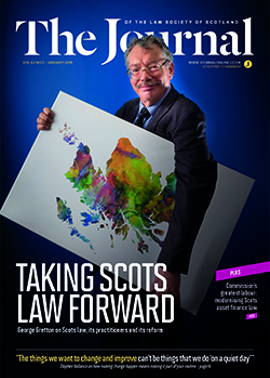Scottish Solicitors' Discipline Tribunal
William Walls
A complaint was made by the Council of the Law Society of Scotland against William Walls, solicitor, St Andrews. The Tribunal found the respondent guilty of professional misconduct in respect that he charged grossly excessive fees in respect of executry and other matters; he took fees without rendering fee notes or otherwise obtaining authority from clients to do so; his financial records did not contain correct firm balances or any ledger reflecting the financial position of the firm, or correct client bank accounts or client balances, all in breach of rule B6.7 of the Practice Rules; he misappropriated funds held on behalf of clients to his own use; and he failed timeously to stamp and record a disposition.
The Tribunal ordered that the name of the respondent be struck off the Roll of Solicitors in Scotland.
The respondent pursued a dishonest course of conduct over a significant period whereby he overcharged clients, failed to render fees and misappropriated their money for his own use. He failed to record a disposition for over seven years. His books and accounts did not accurately show all his dealings with client money and therefore failed to reflect the true financial position of the firm. His client account was in deficit for at least seven months. The Tribunal considered that the professional misconduct in this case was very serious. The respondent’s dishonest course of conduct involving a significant number of transactions was likely to damage the reputation of the legal profession. If he continued to practise, it was likely that he would be a danger to the public. As was noted in McMahon v Council of the Law Society of Scotland 2002 SC 475, a solicitor who is guilty of dishonesty with client money forfeits the respect and trust of the public and his colleagues, and has disgraced his profession. It is a fundamental principle that the client account is sacrosanct. When it is persistently and repeatedly in deficit and when money is taken dishonestly, the court has noted that it is difficult to see how the penalty could be anything other than striking off.
David Rankin
A complaint was made by the Council of the Law Society of Scotland against David James Rankin, solicitor, Stewart & Osborne, 37 Eglington Street, Beith. The Tribunal found the respondent guilty of professional misconduct in respect of his breaches of rules B1.2, B1.5.1, B1.9.1 and B6.23.1 of the Law Society of Scotland Practice Rules 2011. The Tribunal censured the respondent and fined him £3,000.
The respondent was approached by an existing client to prepare a power of attorney and will for the client’s mother. The client’s mother died after the respondent prepared these documents. The respondent recognised from the outset that the deceased was his client and not her son and yet at no stage had he met with the deceased. He had no personal understanding as to the capacity of the deceased. Albeit the family GP had witnessed the deceased’s signatures, the respondent was aware that the deceased’s consultant had declined to sign a certificate of capacity. The respondent had no idea whether his client, the deceased, had understood the effects of the documents she had signed. The certificate the respondent had signed was clearly inaccurate in many areas – he had not interviewed the grantor, could not be satisfied that she understood the nature and extent of the power of attorney and had no personal knowledge of the grantor. The respondent’s conduct clearly fell well below the standard of conduct to be expected of a competent and reputable solicitor to a degree which could only be regarded as serious and reprehensible. The consequences of his misconduct could have been disastrous. The Tribunal was conscious of a large number of mitigating factors. Nonetheless, the Tribunal required to mark the seriousness of the respondent’s conduct and concluded that this would be done appropriately by imposing a censure and a fine of £3,000.
In this issue
- Valuing loss of society: an elusive consistency
- Child maintenance: yet another DWP effort
- Trading futures
- Appeals and extracts: sticking to the rules
- Making the law work better (1)
- Reading for pleasure
- Opinion: Trish McLellan
- Book reviews
- Profile
- President's column
- 2018: keep up the momentum
- People on the move
- "One lifetime is not enough"
- Legally habit-forming
- Equality in service
- The Scottish draft Budget 2018-19: what happened?
- Legal software: has your supplier been bought out?
- Asset finance: time for reform
- Human trafficking from the defence perspective
- Contract law in flux
- The limits of appeal
- Attention media lawyers
- Disability: a new focus
- A tale of two Budgets
- System redesign
- 21st Century Bar rides again
- Scottish Solicitors' Discipline Tribunal
- Happy new year?
- Specialist accreditation scheme relaunches
- Public policy highlights
- Paralegal pointers
- Making the law work better
- At the cutting EDGE
- Confirmation declarations agreed
- Q & A corner
- Documents, data and the GDPR
- Ask Ash
- Appreciation: Ethel May Houston OBE






